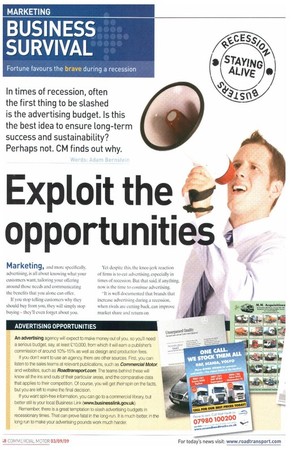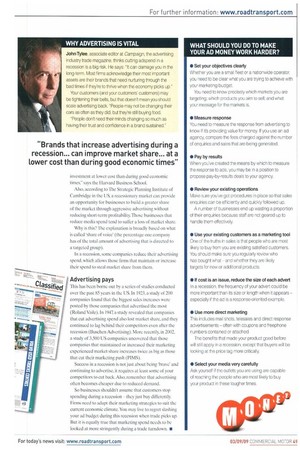Exploit the ei
Page 48

Page 49

If you've noticed an error in this article please click here to report it so we can fix it.
opportunities
Marketing, and more specifically, advertising, is all about knowing what your customers want, tailoring your offering around those needs and communicating the benefits that you alone can offer.
If you stop telling customers why they should buy from you, they will simply stop buying — they'll even forget about you.
Yet despite this, the knee-jerk reaction of firms is to cut advertising, especially in times of recession. But that said, if anything, now is the time to continue advertising.
It is well documented that brands that increase advertising during a recession, when rivals are cutting back, can improve market share and return on investment at lower cost than during good economic times," says the Harvard Business School.
Also. according to The Strategic Planning Institute of Cambridge in the US, a recessionary market can provide an opportunity for businesses to build a greater share of the market through aggressive advertising without reducing short-term profitability. Those businesses that reduce media spend tend to suffer a loss of market share.
Why is this? The explanation is broadly based on what is called 'share of voice' (the percentage one company has of the total amount of advertising that is directed to a targeted group).
In a recession, some companies reduce their advertising spend, which allows those firms that maintain or increase their spend to steal market share from them.
Advertising pays
'this has been borne out by a series of studies conducted over the past 85 years in the US. In 1923, a study of 200 companies found that the biggest sales increases were posted by those companies that advertised the most (Roland Vaile). In 1947, a study revealed that companies that cut advertising spend also lost market share, and they continued to lag behind their competitors even after the recession (Buschen Advertising). More recently, in 2002, a study of 3,500 US companies uncovered that those companies that maintained or increased their marketing experienced market share increases twice as big as those that cut their marketing push (PIMS).
Success in a recession is not just about being 'brave' and continuing to advertise, it requires at least some of your competitors to cut back. Also, remember that advertising often becomes cheaper due to reduced demand.
So businesses shouldn't assume that customers stop spending during a recession — they just buy differently. Firms need to adapt their marketing strategies to suit the current economic climate. You may live to regret slashing your ad budget during this recession when trade picks up. But it is equally true that marketing spend needs to be looked at more stringently during a trade turndown. •




































































































































